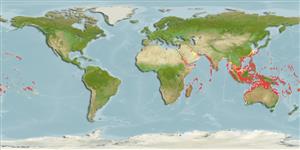>
Mulliformes (Goatfishes) >
Mullidae (Goatfishes)
Etymology: Mulloidichthys: Latin, mullus = soft + Greek, ichthys = fish (Ref. 45335).
More on author: Lacepède.
Issue
The subspecies Mulloidichthys flaviolineatus flavicaudus Fernandez-Silva & Randall, 2016 remains in the synonymy of Mulloidichthys flavolineatus; the two subspecies can be at best understood as two well-differentiated populations, in Uiblein et al., 2020 (Ref. 123209:148).
Environment: milieu / climate zone / depth range / distribution range
Ekologi
laut berasosiasi dengan karang; kisaran kedalaman 1 - 99 m (Ref. 123209). Tropical; 30°N - 37°S, 22°E - 124°W
Indo-Pacific: Red Sea, East and South Africa, Madagascar and Mascarenes to the Hawaiian Is., Line Is. and Pitcairn Group; north to southern Japan and Midway Is.; south to Australia (North West Cape, WA, Eastern Australia, NSW) at 36°S, Lord Howe I. and New Caledonia; one record from New Zealand. Common throughout most of its range (Ref. 9710).
Length at first maturity / Size / Weight / umur
Maturity: Lm 20.8, range 12 - ? cm
Max length : 43.0 cm TL jantan/; (Ref. 9710); common length : 25.0 cm TL jantan/; (Ref. 30573); Berat maksimum terpublikasi: 423.30 g (Ref. 121845)
Duri punggung (Keseluruhan (total)) : 8; duri punggung lunak (Keseluruhan (total)) : 9; Duri dubur: 1; Sirip dubur lunak: 7. Back grey to olive, sides and belly whitish; 1-2 longitudinal yellow bands; dark blotch below 1st dorsal fin (Ref. 5405). Yellow-mid-lateral stripe from eye to tail and some yellow striping on cheek and along abdomen (Ref. 48636). Head length 3.1-3.5 in SL, length of snout 1.9.-2.2 and barbel 1.4-1.7 in HL. Body depth 3.7-4.8 in SL. (Ref. 90102)
Occasionally schooling species inhabit shallow sandy areas of lagoon and seaward reefs (Ref. 9710). Large adults are often found solitary on sand slopes with other species following to feed on prey that are disturbed when the goatfish is feeding (Ref. 48636). Benthopelagic (Ref. 58302). Feed on crustaceans, mollusks, worms, heart urchins and foraminiferans. Consumed fresh or dried. Minimum depth reported taken from Ref. 30874.
Myers, R.F., 1991. Micronesian reef fishes. Second Ed. Coral Graphics, Barrigada, Guam. 298 p. (Ref. 1602)
Status IUCN Red List (Ref. 130435)
ancaman kepada manusia
Reports of ciguatera poisoning (Ref. 130160)
penggunaan manusia
Perikanan: komersial; Ikan buruan: ya; Akuarium: Komersial; umpan: usually
Alat, peralatan
laporan khas
muat turun XML
Sumber internet
Estimates based on models
Preferred temperature (Ref.
123201): 24.5 - 29, mean 27.8 °C (based on 1256 cells).
Phylogenetic diversity index (Ref.
82804): PD
50 = 0.5078 [Uniqueness, from 0.5 = low to 2.0 = high].
Bayesian length-weight: a=0.01072 (0.00936 - 0.01227), b=3.09 (3.05 - 3.13), in cm total length, based on LWR estimates for this species (Ref.
93245).
Trophic level (Ref.
69278): 3.8 ±0.3 se; based on diet studies.
Daya lenting (Ref.
120179): sedang, Waktu penggandaan populasi minimum 1.4 - 4.4 tahun (K=0.16-0.27).
Prior r = 0.57, 95% CL = 0.37 - 0.85, Based on 2 data-limited stock assessments.
Fishing Vulnerability (Ref.
59153): Moderate vulnerability (39 of 100).
Climate Vulnerability (Ref.
125649): Moderate to high vulnerability (46 of 100).
Nutrients (Ref.
124155): Calcium = 41.7 [22.8, 67.6] mg/100g; Iron = 0.474 [0.224, 0.798] mg/100g; Protein = 18.8 [17.0, 20.5] %; Omega3 = 0.159 [0.108, 0.280] g/100g; Selenium = 34.4 [21.0, 57.4] μg/100g; VitaminA = 91.6 [32.7, 311.0] μg/100g; Zinc = 1.01 [0.64, 1.39] mg/100g (wet weight);
